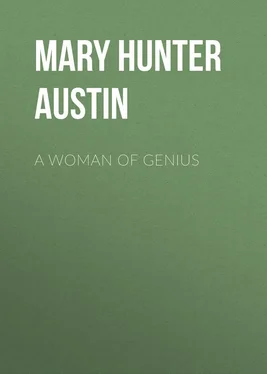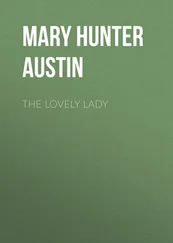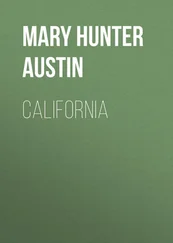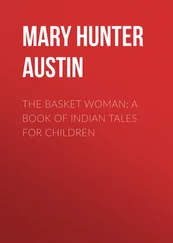Mary Austin - A Woman of Genius
Здесь есть возможность читать онлайн «Mary Austin - A Woman of Genius» — ознакомительный отрывок электронной книги совершенно бесплатно, а после прочтения отрывка купить полную версию. В некоторых случаях можно слушать аудио, скачать через торрент в формате fb2 и присутствует краткое содержание. Жанр: foreign_antique, foreign_prose, на английском языке. Описание произведения, (предисловие) а так же отзывы посетителей доступны на портале библиотеки ЛибКат.
- Название:A Woman of Genius
- Автор:
- Жанр:
- Год:неизвестен
- ISBN:нет данных
- Рейтинг книги:4 / 5. Голосов: 1
-
Избранное:Добавить в избранное
- Отзывы:
-
Ваша оценка:
- 80
- 1
- 2
- 3
- 4
- 5
A Woman of Genius: краткое содержание, описание и аннотация
Предлагаем к чтению аннотацию, описание, краткое содержание или предисловие (зависит от того, что написал сам автор книги «A Woman of Genius»). Если вы не нашли необходимую информацию о книге — напишите в комментариях, мы постараемся отыскать её.
A Woman of Genius — читать онлайн ознакомительный отрывок
Ниже представлен текст книги, разбитый по страницам. Система сохранения места последней прочитанной страницы, позволяет с удобством читать онлайн бесплатно книгу «A Woman of Genius», без необходимости каждый раз заново искать на чём Вы остановились. Поставьте закладку, и сможете в любой момент перейти на страницу, на которой закончили чтение.
Интервал:
Закладка:
At the time when the Snockerty obsession overtook us, Ellen McGee was the only real rival I had for the leadership of the pasture; if she had not had, along with all her Irish quickness, a touch of Irish sycophancy, I should have lost all my ascendency after the advent of Snockerty. I feel sure now that Ellen must have invented him; she was most enviably furnished in all the signs of lucky and unlucky and what it meant if you put your stocking on wrong side out in the morning, with charms to say for warts, and scraps of Old World song that had all the force of incantations. Her fairy tales too had a more convincing sound, for she got them from her father, who had always known somebody who knew the human participators. It was commonly insisted by Mrs. Allingham that the McGee children would never come to anything, and I believe, in fact, they never did, but they supplied an element of healthful vulgarity in our lives that, remembering Alfred Allingham's adolescent priggishness, I am inclined to think was very good for us.
If I have said nothing of my parents until now, it is because the part they played in our lives for the first ten years was, from our point of view, negligible. Parents were a sort of natural appendage of children, against whose solidarity our performance had room and opportunity. They kept the house together; they staved off fear – no one, for instance, would think of sleeping in a place where there were no parents – they bulked large between us and the unknown. There was a general notion of our elders toward rubbing it into us that we ought to be excessively grateful to them for not having turned us adrift, sans food and housing, but I do not think we took it seriously.
Parents existed for the purpose of rendering the world livable for children, and on the whole their disposition was friendly, except in cases like Mrs. Allingham, who contrived always to give you a guilty sense of having forgot to wipe your feet or tramped on the flower borders. I do not think we had a more active belief in our parents' profession of absorption in our interests than in my father's pretence to be desperately wounded by Forester's popgun, or scared out of his wits when Effie jumped at him from behind the syringa bush. It was admittedly nice of them and it kept the game going, but there were also times when they did not manage it so successfully as we could have wished. I think that we never questioned their right to punish us for disobedience, perhaps because there is, after all, something intrinsically sound about the right of might, though we sometimes questioned the occasion, as when we had been told we might play in the pasture for an hour, of the passage of which we knew as much as wild pigeons. There was always, to me at least, an inexplicableness about such reprisals that mitigated against their moral issue. There was one point, however, upon which we all three opposed an unalterable front; we would not kiss and make up after our private squabbles. We fought, or combined against neighbouring tribes, or divided our benefits with an even handedness that obtains nowhere as among children, but we would not be tricked into a status which it might be inconvenient to maintain. I am sure, though, that Mrs. Allingham used rather to put it over my mother for her inability to make little prigs of us.
"Mothers," she would say on the rare occasions when she came to call in the beaded dolman and black kid gloves which other Taylorvillians wore only on Sunday, "MOTHERS," with the effect of making it all capitals, "have an inestimable privilege in shaping their children's characters." This was when we had had our faces surreptitiously washed and been brought in for ceremonial inspection; and a little later she would add, with the air of having tactfully conveyed advice under the guise of information, "I always insist" – here Forester would kick me furtively – " insist on having the full confidence of mine," at which point my mother would make excuses to get me out of the room before I, who never could learn that people are not always of the mind they think they are, made embarrassing disclosures.
Up to this time my mother figures chiefly as a woman who tied up our hurts and overruled my father when he tried to beg us off from going to church. I suppose it was the baby always in arms or expected that kept us from romping all over her as we did with my father; and much of her profession of interest in us, which came usually at the end of admonitory occasions, had the cold futility of the family prayers that my mother tried to make appear part of the habitual order when Cousin Judd came to stay with us.
I do not know whether he suspected the hollowness of our morning worship, but I am sure I was never in the least imposed upon by the high moral attitude from which my mother attempted to deal with my misbehaviours. She used to conduct these interviews on the prescription of certain books by the reading of which I was afterward corrupted, on a basis of shocked solemnity that, as she was not without a sense of humour, often broke down under my raw disbelief. Forester, always amenable to suggestion, was sometimes reduced to writhing contrition by these inquisitorial attempts, but I came away from them oftenest not a little embarrassed by her inability to bring anything to pass by them.
I do not think our detachment was greater than is common with young children in families where they are pushed out of their privilege of cuddling as fast as they were in ours. There was thirteen months between Forester and me, another brother, early dead, before Effie, and two that came after. The children who died were always sickly; I think it probable in the country phrase, so appalling in its easy acceptance, my mother had "never seen a well day"; and what was meant to be the joy of loving was utterly swamped for her in its accompanying dread. I seem to have been born into the knowledge that the breast, the lap, and the brooding tenderness were the sole prerogative of babies; it was imperative to your larger estate not to exhibit the weakness of wanting them. There comes back to me in this connection an evening with us three, Forester, Effie and I, squeezed on to the lowest step of the stairs for company, my mother in the dusk, rocking and singing one of those wildly sweet and tragic melodies that the men brought back out of the South as seeds are carried in a sheep's coat. To this day I cannot hear it without a certain swelling to let in the smell of the summer dusk and the flitter of the bats outside and the quaver of my mother's voice. I could see the baby's white gown hanging over her arm – it was the next one after Effie, and already she must have been expecting the next – and the soft screech of the rocker on the deal floor, and all at once I knew, with what certainty it hurts me still to remember, how it felt to be held so close … close … and safe … and the swell of the breast under the song, and the swing of the rocker … knew it as if I had been but that moment dispossessed … and the need … as I know now I have always needed to be so enfolded.
I do not remember just what happened; I seem to have come to from a fit of passionate crying, climbed up out of it by a hand that gripped me by the shoulder and shook me occasionally by way of hastening my composure. I was struggling desperately to get away from it … away from the mother, who held me so to the mother I had just remembered … and there was Jule, the maid, holding up the lamp, ordering me to bed in the dark for having spoiled our quiet evening. Then after what seemed a long time, Effie snuggled up to me under the covers, terrified by my sudden accession of sobs but too loyal to call down the household upon us.
It came back … the need of mothering. There was a time when I had lain abed some days with the measles or whatever. I was small enough, I remember, to lie in the crib bed that was kept downstairs for the prevalent baby … and my mouth was dry with fever. I recall my mother standing over me and my being taken dreadfully with the need of that sustaining bosom, and her stooping to my stretched arms divinely … and then … I asked her to put me down again. I have had drops and sinkings, but nothing to compare with this, for there was nothing there you understand … the release, the comforting … it wasn't there … it was never there at all !
Читать дальшеИнтервал:
Закладка:
Похожие книги на «A Woman of Genius»
Представляем Вашему вниманию похожие книги на «A Woman of Genius» списком для выбора. Мы отобрали схожую по названию и смыслу литературу в надежде предоставить читателям больше вариантов отыскать новые, интересные, ещё непрочитанные произведения.
Обсуждение, отзывы о книге «A Woman of Genius» и просто собственные мнения читателей. Оставьте ваши комментарии, напишите, что Вы думаете о произведении, его смысле или главных героях. Укажите что конкретно понравилось, а что нет, и почему Вы так считаете.












